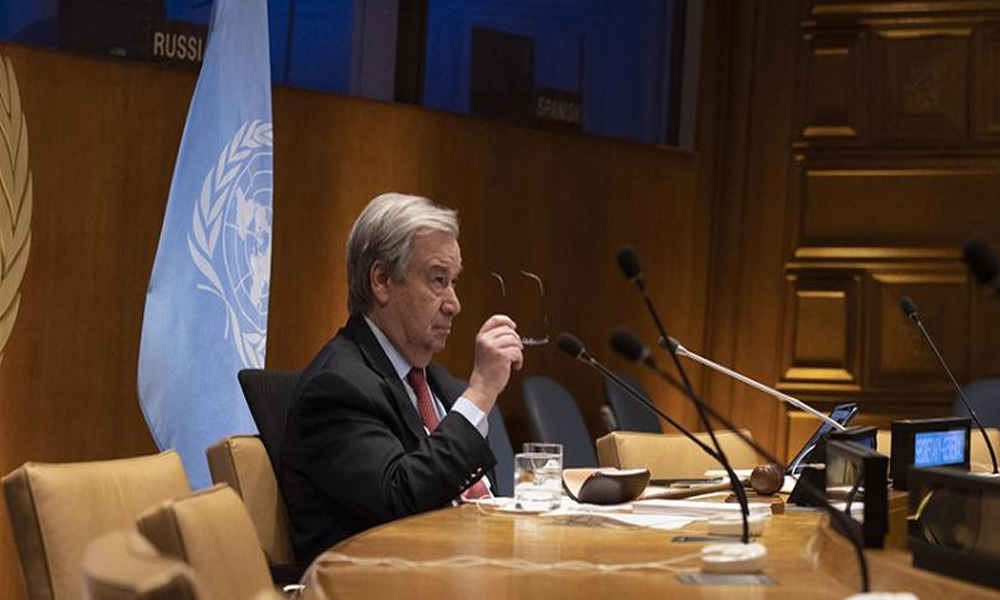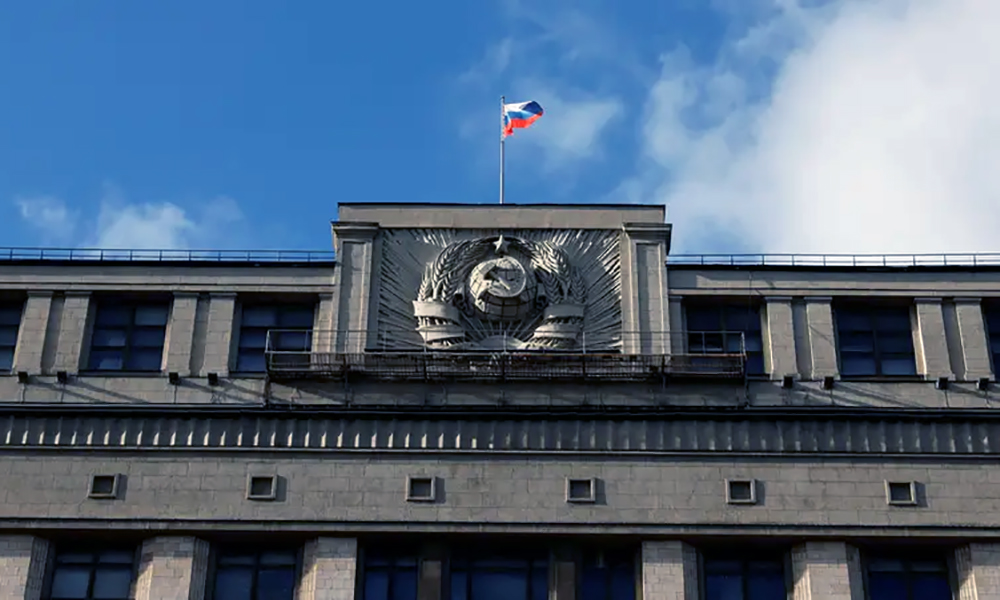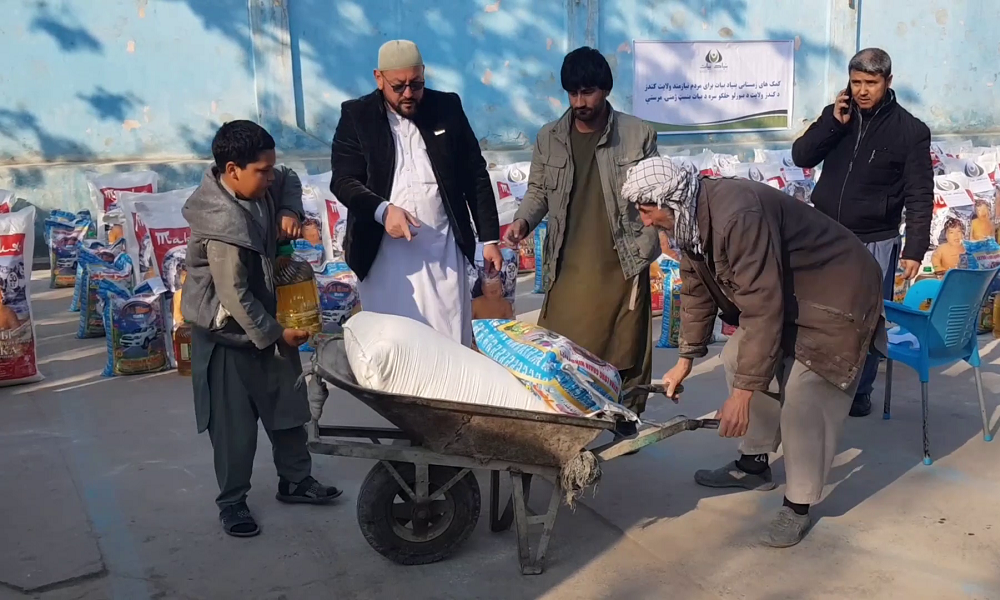Latest News
UN chief tells donor community that one million Afghan children are on verge of death

UN Secretary-General Antonio Guterres warned Thursday that nine million people in Afghanistan are at risk of famine and that about 95 percent of people in the country do not have enough food to eat.
Addressing delegates attending the UN’s high-level Pledging Event on Afghanistan, Guterres said the massive humanitarian response in Afghanistan since August 2021 “undoubtedly saved many lives over the winter”.
He thanked donor nations for their contributions but added that despite collective efforts, the already dire humanitarian situation in Afghanistan has deteriorated alarmingly over the past few months.
He warned that UNICEF estimates that without immediate action, a million severely malnourished children are on the verge of death.
He also stated that as global food prices skyrocket, as a result of the war in Ukraine, “this spells catastrophe for both Afghans struggling to feed their families”, and for UN aid operations.
Without immediate action, we face a starvation and malnutrition crisis in Afghanistan, he said adding that people are already selling their children and their body parts, in order to feed their families.
Guterres noted that “Afghanistan’s economy has effectively collapsed” and that “there is very little cash”.
He went on to state that more than 80 percent of the population is in debt and that key workers in vital services, including schools and hospitals, have not been paid for months.
Listing the hardships faced by Afghans he went on to state that businesses cannot operate; international aid agencies can barely function; and local partners face even greater hurdles.
In addition, livelihoods have evaporated and farmers cannot buy seeds or fertilizers, he said.
“The UN Development Programme has warned that unless we take action, 97 percent of Afghans could be living below the poverty line by the middle of this year. Humanitarian needs have tripled since last June. Yes, tripled.
And they are growing, day by day and month by month,” he warned.
Guterres stated that the international community must find ways to spare the Afghan people from the impact of the decision to halt development support to Afghanistan, and to freeze nearly $9 billion in Afghan assets overseas.
He said the international community “must make cash available, so the Afghan economy can breathe, and the Afghan people can eat.
“Wealthy, powerful countries cannot ignore the consequences of their decisions on the most vulnerable.
“The first step in any meaningful humanitarian response must be to halt the death spiral of the Afghan economy.
“Without that, even the best-funded and most effective aid operation will not save the people of Afghanistan from an unimaginable future,” he warned.
“We stayed, we delivered, and we are determined to keep delivering. Humanitarian aid is providing a fragile lifeline for millions of Afghans,” he said.
Last year, UN humanitarian partners reached nearly 20 million people across the country with life-saving assistance including food, clean water, health care, protection, shelter, education and winterization.
So far this year, the World Food Programme has reached more than 14 million people with food, nutrition and resilience support.
In February alone, UNICEF reached close to four million people across the country with health services. UNICEF personnel screened nearly one million children for malnutrition in February alone and UNHCR, working in areas prioritized for the return of refugees and internally displaced people, has provided support to more than half a million people so far this year.
Guterres stated that UNFPA reached more than a quarter of a million people between August and December last year with reproductive health and protection services, while OCHA’s funding mechanisms, including the Central Emergency Response Fund and the Afghanistan Humanitarian Fund, were integral to getting funds quickly to where they were most needed.
“Our funding appeal for Afghanistan this year is $4.4 billon – the world’s largest appeal for a single country.
“Together with our partners, we aim to reach 22 million people with food, water, health care, protection, shelter, education and other forms of life-saving aid.
“So far, the appeal is currently less than 13 percent funded,” he said.
In line with this, Guterres appealed to the donor community to “provide unconditional and flexible funding as soon as possible”.
He also voiced his disappointment that high school girls have been barred from going to school.
“I deeply regret that girls’ education above sixth grade remains suspended – a violation of the equal rights of girls that damages the entire country and leaves girls more exposed to violence, poverty and exploitation.
“There is simply no justification for such discrimination.
“Educated girls become educated women who lift their families and communities into a better future.
“I call on those with influence to use it to pressure the de facto authorities to fulfil their promise to reopen schools for all students, without discrimination or further delay,” he stated.
However, he said that while waiting for girls to return to school, the world cannot use this issue as a bargaining tool. He said there is no rationale for withholding humanitarian aid based on this decision by the de facto authorities. “The Afghan people cannot be doubly punished,” he said.
In conclusion, he said: “In the weeks and months ahead, I count on coordinated action to find creative solutions to set the Afghan economy back on its feet.”
Latest News
Russian law paves way to recognise Islamic Emirate of Afghanistan
No country currently recognises the IEA government which regained control of Afghanistan in August 2021.

Russia's parliament passed a law on Tuesday that would allow courts to suspend bans on groups designated by Moscow as terrorist organisations - paving the way for it to normalise ties with the Islamic Emirate of Afghanistan annd potentially with the new leadership of Syria.
No country currently recognises the IEA government which regained control of Afghanistan in August 2021.
But Russia has been gradually building ties with the Islamic Emirate, which President Vladimir Putin said in July was now an ally in fighting terrorism.
In addition, the leader of Russia's Muslim region of Chechnya, Ramzan Kadyrov, called on Monday for the removal of Syrian group Hayat Tahrir al-Sham (HTS) from Moscow's list of banned groups.
HTS spearheaded the toppling of Syrian President Bashar al-Assad earlier this month.
Kadyrov, a close Putin ally, said Russia needed ties to the new Syrian authorities to ensure stability and prevent a humanitarian catastrophe.
The Kremlin said this week that Russia was in contact with the new leadership in Syria, where it hopes to retain the use of an airfield and a naval base that give it an important military foothold in the Mediterranean.
Security threat
Moscow sees a major security threat from Islamist militant groups based in a string of countries from Afghanistan to the Middle East, where Russia lost a major ally with the fall of Assad, Reuters reported.
In March, gunmen killed 145 people at a concert hall outside Moscow in an attack claimed by Islamic State.
U.S. officials said they had intelligence indicating it was the Afghan branch of the group, Islamic State Khorasan (ISIS-K), that was responsible.
However, the IEA has repeatedly said it is working to wipe out the presence of ISIS-K in Afghanistan.
Russia’s history in Afghanistan
Russia has a complex and bloodstained history in Afghanistan.
Soviet troops invaded the country in December 1979 to prop up a Communist government, but became bogged down in a long war against mujahideen fighters armed by the United States.
Soviet leader at the time, Mikhail Gorbachev, pulled his army out in 1989, by which time some 15,000 Soviet soldiers had been killed.
Latest News
Kunduz families get much needed food aid, thanks to Bayat Foundation
The Bayat Foundation is a stalwart in terms of assisting needy people, not only through its winter food aid campaign but also in times of disaster.

As part of its ongoing commitment to supporting needy families in winter in Afghanistan, the Bayat Foundation has once again provided essential food aid to hundreds of needy families in Kunduz province.
The Bayat Foundation’s representative in the northeastern zone, Khair Mohammad Saljoqi, explained that the relief packages included flour, rice, and oil, which were distributed to the needy after a thorough survey.
He stated: “The Bayat Charity Foundation continues its annual winter aid distribution [program]. This year, we have prepared winter relief packages for the needy in Kunduz, and today we are witnessing the distribution.”
Meanwhile, recipients have expressed their gratitude for the timely delivery of the relief packages and have called for further assistance from other humanitarian organizations for impoverished families.
One of the aid recipients, expressed his appreciation, saying: "We are very grateful to the Bayat Foundation."
Another recipient said: “We are very happy that the Bayat Foundation has helped the poor people. May God give strength to the Bayat Foundation to continue helping needy families, as it is winter, the weather is cold, and there is no work.”
Additionally, several women, who are the sole breadwinners for their families, shared that they have no food or warm clothing to get them through winter and are in desperate need of such assistance.
They also thanked the Bayat Foundation for their assistance.
Rukhshana, one of the recipients, said: “Please help us. We don’t have a breadwinner at home. I have small children. Traders should help us. We have no firewood, no coal. We thank the Bayat Foundation for helping us.”
The Bayat Foundation is a stalwart in terms of assisting needy people, not only through its winter food aid campaign but also in times of disaster.
Foundation officials have meanwhile stressed that given the growing poverty and worsening hardships people are facing in the country, their winter aid program will continue to be rolled out to other provinces.
Latest News
India hoping to import coal and marble from Afghanistan

A high-ranking delegation from India's Gujarat Chamber of Commerce has expressed interest in importing coal and marble from Afghanistan and investing in Afghanistan's coal mining sector.
The officials expressed interest at a meeting with Ikramuddin Kamil, acting head of the Afghan consulate in Mumbai, India.
Kamil assured them that he would facilitate an online meeting at a technical level with the relevant Afghan institutions in this regard.
He said security is ensured in Afghanistan, corruption does not exist and there are investment opportunities for Indian businessmen.
-

 Latest News4 days ago
Latest News4 days agoAfghanistan seals T20I series victory over Zimbabwe
-

 World4 days ago
World4 days agoSyrian clerics in former Assad stronghold call for national unity, democracy
-

 Latest News4 days ago
Latest News4 days agoU.S. sentences Afghan man to 30 years in prison for narco-terrorism and witness tampering
-

 Latest News5 days ago
Latest News5 days agoDAB has collected over 7 billion Afghanis in worn-out banknotes over past year
-

 International Sports3 days ago
International Sports3 days agoMessi vs Ronaldo: A look at their market values over the years
-

 Latest News4 days ago
Latest News4 days agoInvestment in Afghanistan’s pharmaceutical sector reaches $300 million: Union
-

 Latest News4 days ago
Latest News4 days agoChinese, Tajik officials discuss Afghanistan
-

 Sport4 days ago
Sport4 days agoAfghanistan’s Gulbaddin Naib fined 15% of match fee for dissent
























